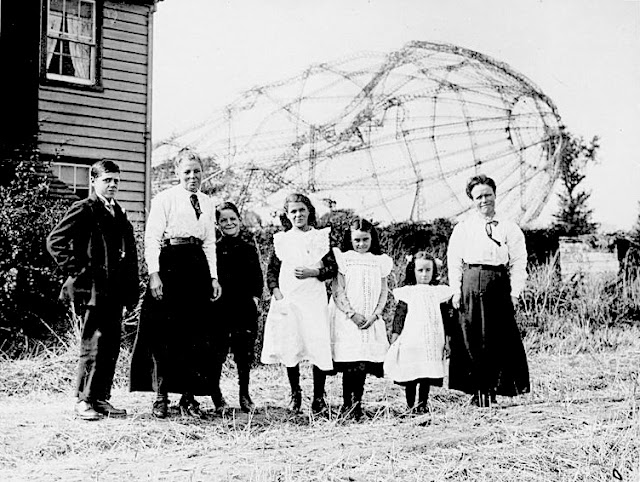Source: File: The
wreck of Zeppelin L 33 near New Hall Cottages, Essex coast. See an original image at: <https://www.flickr.com/photos/britishlibrary/12459200283/>
[Accessed 3 April 2017]
Source: File: Mrs. Lewis and
family in front of a zeppelin L 33 down, September 1916,
New Hall Cottages, Essex
coast. See an original image at: <https://www.flickr.com/photos/nationaalarchief/6934945744/>
[Accessed 3 April 2017]
i
Within the rural idyll of
Essex,
Came events of war to break
the peace.
An enemy mission sent on a
raid
Above English soil saw
Zeppelins in skies
Over villages, as in Little
Wigborough.
Not far from sea and
estuaries,
Proved a likely route to and
from London
For Zeppelins seeking escape
Across the North Sea, over English rural land
And farms as happened with L
33.
In what had become a fairly
Common event, new German
zeppelins
Chanced a raid on English
Capital city in month of
September 1916.
L 32 and L 33 found trouble.
L32 making its way to London
Was seen by anti aircraft
gunnery, dropping
Bombs close to Purfleet -
after
Turning about an interception
came by RFC's
Frederick Sowrey on night
patrol.
Lit by searchlights L 33 proved
Easy target for Sowrey, to
fire incendiaries
Into the craft's belly; the
zeppelin
Being downed at Great
Burstead, fairly close
To Snails Farm by area of
Billericay.
Zeppelin L 33 managed to
reach
Target of London to have
some success
Killing civilians - the crew
led
By Kapitan Alois Bocker - but
came under
Anti aircraft fire to gain
damage.
Night patrols targeted the enemy
Close to Chelmsford - taking
various hits
L 33 escaped to continue over
Essex, throwing out equipment
ballast
In attempt to regain height.
Yet Bocker knew any
successful
Escape across sea had become
impossible.
Travelling for a short distance
They made it to fly over
Little Wigborough
And isolated New Hall
Cottages.
ii
The airship became grounded
In the darkness - Kapitan Bocker
felt duty
To inform any local people
Of crews intentions to
destroy the ship; likely
Including a scared Lewis family.
Including a scared Lewis family.
They knocked on doors; fearful
Families would not answer to
Germans.
Giving up, the crew set fire
To wrecked L33 and after it
had exploded
The crew calmly left.
In smart fashion the Germans
Marched along lanes to make their
way
Towards Peldon - police were
Aware of the Zeppelin, as a
lone constable
On a bicycle appeared.
PC Nicholas surprised
To see these marching men in
night's depth
Halted - by torchlight he
Quizzed if they had seen a
zeppelin landing;
Bocker spoke politely.
He asked how far to Colchester.
Detecting an accent PC Nicholas
advised him
Six miles - he then followed
The marching men into Peldon
village, where
PC354 Smith took charge.
After their formal arrest
An organised escort of 8 special
constables
Politely marched Germans
To Mersea Island. Meeting
military halfway,
The crew were handed over.
While Constable Nicholas
Had single handed, routed
them to Peldon -
Promotion was given over
To Constable Smith, for his
cool act of arrest;
To be known as Sgt. 'Zepp'
Smith.
iii
With polite, orderly nature
Of an enemy crew made
captives, such downed
Crafts like Zeppelin L32
Were quick targets for eager
souvenir hunters;
Even if a smouldering wreck.
Barely two hours after
L32 had been struck down, many
local people
Were out to see wreckage -
Long lines of car lights
from London invaded
The area, to cause chaos.
By 8 a.m. local narrow lanes
And approaches were blocked
by traps, motor
Cars, pedestrian’s, motor
Cycles, carts and bicycles, along with hundreds
Of cyclists cluttering the
fields.
Quite undeterred by rows
Of armed soldiers and police
protecting the site,
Figures eagerly scoured
Any fields for wreckage
signs; a local economy
Boosted by lemonade sellers.
The L33 was yet another
Burnt wreck of twisted aluminium, to attract
Civilian hunters of remnants.
That same month an Essex
bench had seen
A postcard seller and
Innkeeper.
Innkeeper Edward Straggling,
Along with postcard vendor
Jack Lewis (maybe
Of New Hall Cottages), were
Both charged Under Defence
of the Realm Act,
For holding wreckage
fragments.
Jack Lewis had been seen
On the streets, to show various
zeppelin relics,
Selling pieces for 1
shilling.
Edward Straggling parked his
motorbike then
Met Lewis with a bag of
items.
An officer of the law saw and
Approached; the bag held aluminium
pieces
Which were zeppelin parts
The Police officer proceeded
to arrest them.
Straggling took to his bike.
Although the case was to be
Dismissed the chairmen
stated it was sad
How people made money
In such a way, when their
lives were in danger
From enemy crafts.
Some months later such
Events continued - on 30 March 1917 saw
A man of Essex, a ploughman
Charged before a magistrate,
for keeping
Stolen zeppelin items.
Aluminium frames along
With girders from the L33, which came down
Close to his cottage,
24 September 1916. He held a
speedometer
Of the craft, found 4 months
later.
He advised the magistrate
The large items were given to
him by those who
Removed the zeppelin.
Believing he held no guilt
a case was dismissed,
Yet with a final request.
In memory of September
Night when the German crew
came knocking
On his house door, might
He keep the aluminium
fragments? - the Bench
Agreed, decision was no.
by Jamie Mann.
Anon.,1917.
Zeppelin Mementoes. The Daily Telegraph, [online] 02 April 1917. P.5. Col.6. Available
at: <http://www.telegraph.co.uk/news/ww1-archive/12214426/Daily-Telegraph-April-2-1917.html>
[Accessed: 03 April 2017].
Source: File: Two Zeppelins
on a bombing mission brought down in Essex.. Available at: <http://www.historyhouse.co.uk/articles/zeppelins.html>
[Accessed 03 April 2017]
Mann, J., 2016. 100
years Ago - Poems by Jamie Mann. [letter] (Personal communication, 03 April
2017).
#WW1
#WW1centenary #GreatWar #WW1poem #GreatWar #WW1centenary #worldwarone
#worldwaroneremembered #WW1Zeppelins


No comments:
Post a Comment